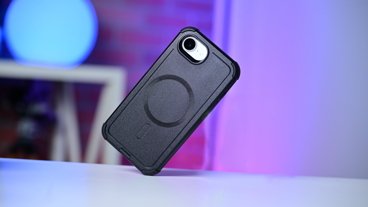The landlord behind Apple's flagship Michigan Avenue store in Chicago is putting the building up for sale, only months after its completion and opening.
Walton Street Capital has turned to Eastdil Secured to market the store, along with 10,000 square feet of retail space in 401 N. Michigan Avenue, a 35-story tower next door, the Wall Street Journal said on Tuesday. Sources for the paper said that Walton is aiming to generate as much as $175 million.
In 2017 the company paid $370 million for the Apple store and the whole of 401, the former still being under construction at the time. Walton is expected to hold on to 401's office space.
Last week Eastdil was allegedly talking with potential buyers for the Apple store at the Mipim real estate conference in Cannes, France.
Due to its clout, Apple is currently paying a rent "well below" the average $400 to $500 per square feet of other businesses in the Michigan Avenue area, the Journal's sources claimed. A change in landlords could affect rates, though Apple is one of the few U.S. retailers thriving as more shopping moves online, even able to produce a "halo" effect with nearby stores.
Apple Michigan Avenue opened in October to much fanfare, including a visit by CEO Tim Cook and retail head Angela Ahrendts. Shortly after it launched, however, the store's glass facade was responsible for some migratory bird deaths, which forced the company to dim lights.
A glitch in the roof's heating system required Apple to cordon off areas with falling snow and ice. A window at the store developed a crack, which grew larger over time given the temperature swings, before it was replaced.
 Roger Fingas
Roger Fingas








 Malcolm Owen
Malcolm Owen
 Amber Neely
Amber Neely
 Andrew Orr
Andrew Orr
 William Gallagher
William Gallagher
 Christine McKee
Christine McKee
 Sponsored Content
Sponsored Content










13 Comments
While I am not a real estate attorney, my guess is that Apple's contract may need to be renegotiated with the new landlord.
Contracts are agreements between two parties, in this case Renter A (Apple) and Owner W (Walton Street Capital). At least here in California, if the ownership changes, the contract between the two parties is voided. Whether it be in residential real estate or commercial real estate, typically the leases need to be renegotiated. There's probably a law that states that the previous contract is in effect on a month-to-month basis.
Let's say Renter X is renting space ($3000 month) for a bar in Owner A's Building A. Owner A sells Building A to Owner B. The lease agreement between Renter X and Owner A is now voided and a new contract must be negotiated with Owner B.
Let's say Owner B decides he wants to raze the existing property and build new condominiums; this happens all the time. Owner B gives 60-day notice to Renter X that the building is set for demolition and they have 60 days to move out.
In a different scenario, let's say Owner B wants to increase the rent to $10,000/month. The old agreement is void so either Renter X needs to negotiate new terms or move out. Again, this is very commonplace here in California.
I am not sure how real estate contracts are interpreted in Illinois.
In this case, the new owner of the property might tell Apple that rent is going up to $600/sq. ft. Apple can choose to move elsewhere. They are paying less than the average commercial retail rental rates for the area ($400-500), let's say Apple is paying $300. Perhaps a different landlord down the street would be happy to have a prestigious tenant such as Apple. Or maybe the new owner of the existing property says, "Yeah, let's keep the terms the same rather than let the property go empty and hope we can find a new long-term tenant who will pay more."
The article over at MacRumors about the same topic provides a little more detail.
Saying that Apple pays significantly less rent is not misleading. They are paying "well below" average commercial rent in the same neighborhood.
The AppleInsider article states that Walton Street Capital intends on keeping the office space property in the nearby tower; it has nothing to do with retiring and moving to an island. Walton Street Capital are just selling the retail spaces. It is likely that this owner simply want to get out of the commercial retail rental market. Retail is shrinking so it is becoming more challenging to make sure commercial retail spaces are occupied. Splitting the office real estate from the commercial retail real estate might have been in Walton Street Capital's original plans.